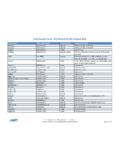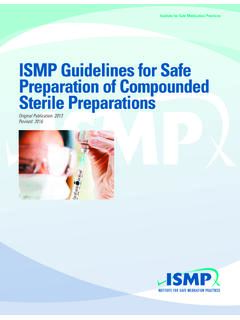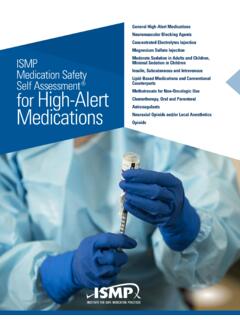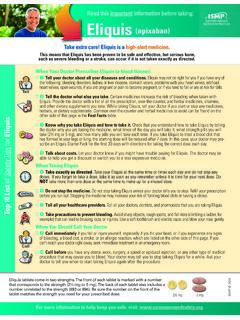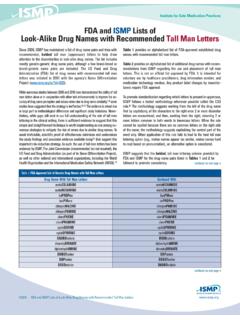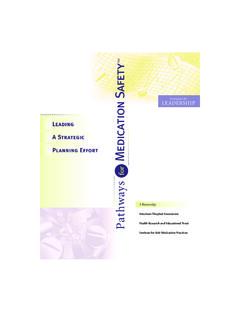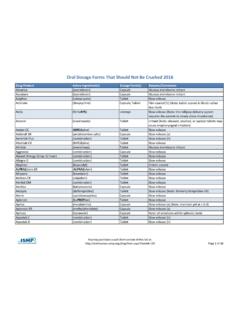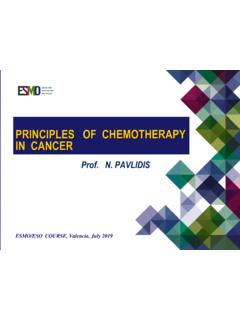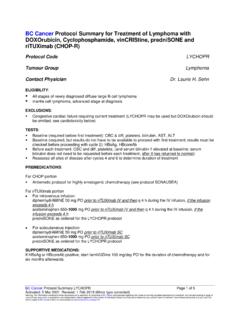Transcription of 2020-2021 ISMP Targeted Medication Safety Best Practices ...
1 Targeted Medication Safety Best Practices for Hospitals2020-202122020-2021 ISMP Targeted Medication Safety Best Practices for HospitalsThe purpose of the ISMP Targeted Medication Safety Best Practices for Hospitals is to identify, inspire, and mobilize widespread, national adoption of consensus-based Best Practices for specific Medication Safety issues that continue to cause fatal and harmful errors in patients, despite repeated warnings in ISMP publications. Hospitals and health systems can focus their Medication Safety efforts over the next 2 years on these Best Practices , which are realistic and have been successfully adopted by numerous organizations. While Targeted for the hospital-based setting, some Best Practices are applicable to other healthcare settings. The ISMP Targeted Medication Safety Best Practices for Hospitals have been reviewed by an external Expert Advisory Panel and approved by the ISMP Board of Trustees. Related issues of the ISMP Medication Safety Alert!
2 Are referenced after each Best Practice (bolded dates indicate those that are key articles).ISMP encourages hospitals that have not implemented the ISMP Targeted Medication Safety Best Practices for Hospitals to do so as a priority, while implementing the new and revised Best Practices for 2020-2021 . Four Best Practices (numbers 4, 5, 8, and 11) have been revised for 2020-2021 ; two new Best Practices (numbers 15 and 16) were added; Best Practice number 12 was incorporated into new Best Practice number 15; and one Best Practice (number 6) was archived. Related documents include ISMP Targeted Medication Safety Best Practices for Hospitals Frequently Asked Questions (FAQs) and an ISMP Targeted Medication Safety Best Practices for Hospitals Implementation Worksheet. 2020-2021 ISMP Targeted Medication Safety Best Practices for Hospitals3 BEST PRACTICE 1:Dispense vinCRIS tine and other vinca alkaloids in a minibag of a compatible solution and not in a : The goal of this Best Practice is to ensure that vinca alkaloids are only administered by the intravenous route.
3 Vinca alkaloids (vinBLAS tine, vinorelbine, vinCRIS tine, vinCRIS tine liposomal, etc.) can cause fatal neurological effects if given via the intrathecal route instead of intravenously. VinCRIS tine is particularly problematic and the most frequently reported vinca alkaloid associated with inadvertent intrathecal administration. Deaths have been reported throughout the world when the drug was dispensed in a syringe and given into spinal fluid instead of intravenously. For example, more than 130 cases have been reported worldwide with vinCRIS tine given to leukemic patients. This often happens when a syringe of vinCRIS tine is mistakenly used instead of a syringe of cytarabine, hydrocortisone, or methotrexate, which are supposed to be given into spinal fluid to the same leukemic patient. When vinca alkaloids are injected intrathecally, destruction of the central nervous system occurs, radiating out from the injection site. The few survivors of this Medication error have experienced devastating neurological damage.
4 Despite repeated warnings by various national and international Safety agencies, deaths from this type of error still occur. The product labeling of all currently marketed vinca alkaloids also carry a special warning ( For Intravenous Use Only Fatal If Given by Other Routes ). An effective prevention strategy that reduces the risk of inadvertently administering vinca alkaloids via the intrathecal route is to dilute the drug in a minibag that contains a volume that is too large for intrathecal administration ( , 25 mL for pediatric patients and 50 mL for adult patients). Many organizations have successfully switched to preparing vinca alkaloids in minibags, including pediatric hospitals and health systems, overcoming concerns of extravasation and other complications. There have been no reported cases of accidental administration of a vinca alkaloid by the intrathecal route when dispensed in a minibag. This Best Practice is supported by The Joint Commission (TJC),1 the American Society of Clinical Oncology (ASCO),2 the Oncology Nursing Society (ONS),2,3 the National Comprehensive Cancer Network (NCCN), and the World Health Following ISMP s Call to Action in March 2019 to have administration by syringe removed from instructions in all vinca alkaloids product labeling, NCCN and TJC have sent letters to the US Food and Drug Administration (FDA) in support of the 2019, the International Medication Safety Network (IMSN) introduced new Global Targeted Medication Safety Best Practice 2 - Prepare and dispense vinca alkaloids in a minibag, never in a syringe aimed at preventing fatalities due to Medication errors with inadvertent intraspinal injection of vinCRIS tine.
5 References: Joint Commission. Eliminating vincristine administration events. Quick Safety . 2017;37:1-3. ( ) MN, Gilmore TR, Belderson KM, et al. 2016 Updated American Society of Clinical Oncology/Oncology Nursing Society Chemotherapy Administration Safety Standards, including Standards for Pediatric Oncology. J Oncol Pract. 2016;12(12):1262-71. L. Preventing vincristine administration errors: does evidence support minibag infusions? Clin J Oncol Nurs. 2006;10(2):271-3. Health Organization. vincristine (and other vinca alkaloids) should only be given intravenously via a minibag. Information Exchange System, Alert No. 115, July 18, 2007. ( )Best Practice 1 First Introduced: 2014-2015 Related ISMP Medication Safety Alerts!: April 11, 2019; March 14, 2019; September 5, 2013; May 20, 2010; August 14, 2008; July 26, 2007; May 18, 2006; February 23, 2006; December 1, 2005; May 1, 2003; February 6, 2003; April 5, 2000; November 4, 1998; September 23, 1998; June 18, 1997.
6 2020-2021 ISMP Targeted Medication Safety Best Practices for Hospitals4 BEST PRACTICE 2: a)Use a weekly dosage regimen default for oral methotrexate in electronic systems when Medication orders are )Require a hard stop verification of an appropriate oncologic indication for all daily oral methotrexate orders. For manual systems and electronic order entry systems that cannot provide a hard stop, clarify all daily orders for methotrexate if the patient does not have a documented appropriate oncologic diagnosis. Hospitals need to work with their software vendors and information technology departments to ensure that this hard stop is available. Software vendors need to ensure that their order entry systems are capable of this hard stop as an important patient Safety component of their )Provide specific patient and/or family education for all oral methotrexate discharge orders. Double-check all printed Medication lists and discharge instructions to ensure that they indicate the correct dosage regimen for oral methotrexate prior to providing them to the patient.
7 Ensure that the process for providing discharge instructions for oral methotrexate includes clear written instructions AND clear verbal instructions that specifically review the dosing schedule, emphasize the danger with taking extra doses, and specify that the Medication should not be taken as needed for symptom control. Require the patient to repeat back the instructions to validate that the patient understands the dosing schedule and toxicities of the Medication if taken more frequently than prescribed. Provide all patients with a copy of the free ISMP high-alert Medication consumer leaflet on oral methotrexate (found at: ). Best Practice 2 First Introduced: 2014-2015 Related ISMP Medication Safety Alerts!: August 9, 2018; September 19, 2013; March 26, 2009; December 13, 2007; November 4, 2004; December 3, 2002; April 3, also: ISMP QuarterWatch December 4, 2019. : The goal of this Best Practice is to prevent errors involving inadvertent daily dosing of oral methotrexate both in the inpatient setting and after discharge.
8 Since early 1996, harmful and fatal errors have been reported to ISMP involving the accidental daily dosing of oral methotrexate that was intended for weekly administration. Methotrexate is a folate antimetabolite used to treat different types of cancers. Since the drug s introduction, its labeled indications have expanded to include non-oncologic uses. It is now used to treat a variety of autoimmune diseases ( , psoriasis, severe rheumatoid arthritis, lupus) and other disorders. When used for immunomodulation to treat disorders such as rheumatoid arthritis, the drug is administered once a week. Prescribing errors occur when physicians or other providers, who are familiar with prescribing many medications for daily administration, erroneously prescribe this Medication daily instead of weekly. Dispensing errors occur in much the same way, when pharmacy technicians and pharmacists inadvertently select/approve daily instead of weekly administration during order entry or verification.
9 Patient errors have occurred when complex directions were misunderstood. While patient harm and fatalities have occurred during hospitalization, many have occurred after discharge. Ongoing errors with oral methotrexate for non-oncologic use suggest that more needs to be done to reduce the risk of patient harm. It is important for hospitals not only to ensure that the proper dosage regimen is administered during hospitalization, but also to implement effective, proactive strategies so that the proper dosage regimen is maintained after discharge. While all hospitals routinely provide discharge instructions to patients and/or families about the patients Medication use after discharge, extra attention is important with oral methotrexate so that the patient and/or family understands both the proper dosage regimen and potential toxicities when taking more than on next page2020-2021 ISMP Targeted Medication Safety Best Practices for Hospitals5 Rationale: The first goal of this Best Practice is to ensure, as much as possible, that the patient s actual weight is obtained upon each admission or appropriate encounter.
10 Many Medication doses are based on the patient s weight. Relying on a stated, estimated, or historical weight can cause inaccurate dosing (both under- and overdosing). The second goal is to standardize the measurement and communication of a patient s weight using only metric units of measure (grams [g] and kilograms [kg]). Official product labeling for medications provides weight-based dosing using only the metric system ( , mg/kg, units/kg). Significant Medication errors have occurred when the patient s weight was communicated and/or documented in non-metric units of measure (pounds and ounces) and was confused with kilograms or grams. Numerous mistakes have been reported in which practitioners converted a weight from one measurement system to another, or weighed a patient in pounds, but accidentally documented the weight value as kilograms in the medical record, resulting in more than a two-fold dosing Practice 3 First Introduced:2014-2015 Related ISMP Medication Safety Alerts!
